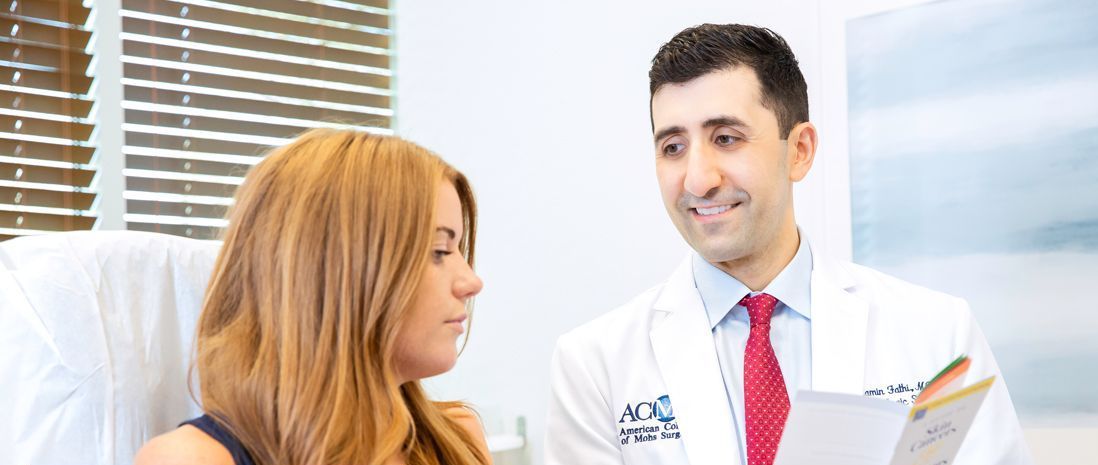Skin Cancer Screenings in Phoenix, AZ
Early detection saves lives—schedule your full-body skin exam today.
Regular Screenings Are Key to Catching Skin Cancer Early
Skin cancer is one of the most common forms of cancer—and also one of the easiest to detect with proper screening. Because most skin cancers begin on the surface of the skin where they can be seen, routine skin cancer screenings play a critical role in identifying abnormal growths early, when they are most treatable.
At
Phoenix Surgical Dermatology Group, we provide thorough skin cancer screenings performed exclusively by board-certified dermatologists who are trained to recognize subtle signs of skin cancer, including
melanoma,
basal cell carcinoma (BCC), and
squamous cell carcinoma (SCC). Our goal is early diagnosis, effective treatment, and peace of mind for our patients.
Why Are Skin Cancer Screenings Important?
Most skin cancers, when caught early, are highly curable. Unfortunately, some skin cancers may not cause noticeable symptoms in the early stages, making regular skin exams essential for early detection.
Benefits of Regular Skin Cancer Screenings:
- Early detection of skin cancer when treatment is most effective
- Identification of precancerous lesions like
actinic keratosis
- Reduced risk of cancer spreading or becoming life-threatening
- Monitoring of high-risk individuals (personal or family history of skin cancer, fair skin, excessive sun exposure)
- Tracking of suspicious moles or lesions over time for any changes
What to Expect During a Skin Cancer Screening
A comprehensive skin cancer screening involves both a detailed history of your skin concerns and a full-body skin examination under proper lighting conditions.
The Screening Process Includes:
- Detailed Patient History:
- Review of current skin complaints
- Discussion of personal and family history of skin cancer
- Evaluation of risk factors, including sun exposure, tanning bed use, or immune suppression
- Full-Body Skin Examination:
- Visual inspection from head to toe, including scalp, ears, nails, palms, soles, and between fingers and toes
- Performed under bright, consistent lighting for optimal visibility
- Dermatoscopic Evaluation:
- Use of a dermatoscope, a specialized magnifying device, to closely examine any suspicious spots
- Enhances diagnostic accuracy and helps avoid unnecessary biopsies
- Allows visualization of deeper skin structures beyond what the naked eye can see
- Photographic Monitoring (If Needed):
- High-definition digital photography to document lesions of concern
- Enables comparison of moles and lesions over time to detect subtle changes
At Phoenix Surgical Dermatology Group, we prioritize careful, detailed evaluation and ensure that your screening is always performed by a board-certified dermatologist.
Who Should Get a Skin Cancer Screening?
While everyone can benefit from regular skin exams, certain individuals are at higher risk and should have screenings more frequently.
You May Be at Higher Risk If You:
- Have fair skin, light eyes, or red/blonde hair
- Have a personal or family history of
skin cancer (melanoma, BCC, SCC)
- Have numerous or atypical moles (dysplastic nevi)
- Experienced
severe sunburns, especially during childhood
- Use tanning beds or have high cumulative sun exposure
- Have a
weakened immune system due to organ transplant, HIV, or medications
- Notice a mole that is changing in size, shape, or color
If you fall into any of these categories, we recommend annual skin checks or more frequent exams as advised by your
dermatologist.
Frequently Asked Questions About Skin Cancer Screenings
How often should I have a skin cancer screening?
Most individuals should have a full-body skin exam once a year. If you have additional risk factors, your dermatologist may recommend more frequent screenings.
What happens if my dermatologist finds something suspicious?
If a lesion appears concerning, your dermatologist may perform a skin biopsy, which involves removing a small sample of tissue for laboratory analysis to confirm whether the cells are benign, precancerous, or cancerous.
Does a skin cancer screening hurt?
No, a skin cancer screening is non-invasive and painless. A biopsy, if needed, is done under local anesthesia to ensure your comfort.
Can I do a self-exam at home?
Yes, monthly self-skin exams are encouraged. Use a full-length mirror and hand mirror to check all areas of your body. Look for any new moles, changes in existing moles, or spots that itch, bleed, or won’t heal. Report any changes to your dermatologist.
What is a dermatoscope, and why is it important?
A dermatoscope is a handheld magnifying device that helps dermatologists view skin lesions in greater detail. It improves diagnostic accuracy and reduces unnecessary biopsies by allowing clearer assessment of mole patterns beneath the skin’s surface.
Schedule Your Skin Cancer Screening Today
Don’t wait until a suspicious spot becomes a serious problem. Early detection is the key to successful skin cancer treatment. Contact Phoenix Surgical Dermatology Group today to schedule your comprehensive skin cancer screening with one of our expert, board-certified dermatologists.
Your skin health is our priority — let us help you stay safe and protected.





